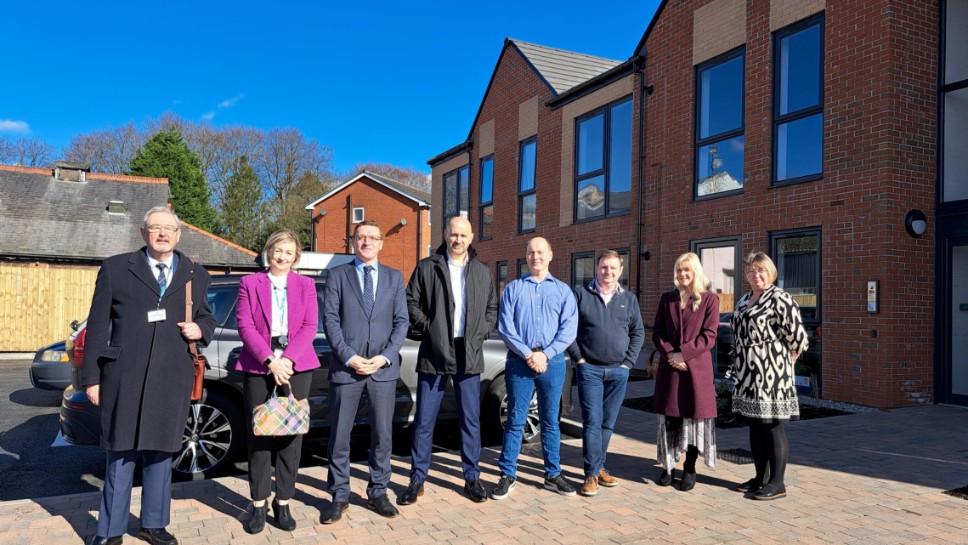
New high-tech supported living flats up and running in Preston
Residents have moved into new supported living apartments on a former bowling green in Preston.
The 13 attractive apartments at Mornington Road are the latest addition to Lancashire County Council's supported living accommodation, helping adults with learning difficulties and disabilities to live as independently as possible with access to care and support.
Featuring high-tech equipment which can help with day to day living, each of the flats are decked out with ground-breaking technology. This includes multi-sensors that monitor motion, presence, and sound levels which can notify if a resident needs assistance, while doors, windows and blinds, lighting, heating, and temperature can be remotely operated by residents. Meanwhile, each occupant will have their own front door, access to a garden and a communal lounge, and a highly personalised package of support and care.
Developments like these are a key part of Living Better Lives in Lancashire, the county council's vision for social care. This promotes support that helps people focus on what they can do, rather than what they can't, while ensuring people are connected to their community where they can get support to help them stay well.
Resident Jake Holland, who has just moved in, said: "I like this flat – it's quite big and there's lots of space to put your stuff. It's also really quiet as well and the staff are really nice.
"There is also a touch screen that you can use if you need help."
Similarly, another young person who is due to move in to the apartments, said: "I absolutely love this place - it's really bright and airy, and I can't wait to live independently with support."
Lisa Sanderson, registered manager for Lancashire County Council's domiciliary care team, agrees the results are plain to see.
She said: "The people we support who have moved in or are currently in transition are really benefiting from the personalised support. There is a range of support with daily living and activities.
"The flats have assistive technology that can maximise a person's independence, including self-closing blinds and windows and daily reminders about medical appointments and medication prompts."
The new development has risen from the ashes of the former Fishwick Ramblers’ Club and bowling green which is understood to have lain empty since the club closed a decade ago. Designed by Preston-based David Cox Architects, it has been created by specialist property developer Weaver Finch with a loan of £1.75m from property lender Together, and was handed over from builders Tyson Construction to landlord Care Housing Association last month.
With the innovative technology provided by assistive technology company MyEcosystem, and care provided by Lancashire County Council's domiciliary care team, the Mornington Road site is among the most advanced integrated assisted living projects in the UK.
It joins the ranks of Lancashire County Council’s 2000 'supported living' developments across the region in places like Chorley, Burnley, Fleetwood, Preston, Lancaster, Burnley and Fylde.
Lancashire County Council plans to hugely increase this type of care, along with other types of support in people’s homes in the next 15 years, so that they co-exist alongside traditional residential care.
The plans include 550 homes for working age people with learning disabilities or autism, 250 homes for working age adults with serious mental health needs and 190 new homes for adults with physical disabilities or long-term conditions over the next decade.
It’s anticipated the move will enable much-needed care and support in people’s homes, as well as hundreds of new jobs in the care sector in Lancashire.
County Councillor Graham Gooch, cabinet member for Adult Social Care, paid a visit to the Mornington Road apartments to talk to residents and find out what they think.
He said: "I’m delighted that these beautiful apartments are supporting adults with learning or physical disabilities, or autism, to live as fulfilled and independent lives as possible. This is exactly what we're promoting through Living Better Lives in Lancashire – supporting people to achieve what they want while living independently in a place they call their home.
"They are fully equipped with the very best in assistive technology, such as sensors, automated door openers, blinds and heating systems, and they can really help to increase residents' privacy and dignity, whilst ensuring that extra help is there when needed.
"I'm very impressed with this innovative new technology. Supported living facilities are an attractive alternative to traditional, long-term residential care. The rollout of such developments across Lancashire in the near future is a hugely important measure, which will help people to live better lives, improve health outcomes and support safer hospital discharges by providing the right care, in the right place and at the right time."
Christian Geisselmann, of My Ecosystem, the company that has provided the hi-tech Ecosystem approach, said: "We have been working with Lancashire County Council to create a very bespoke package of assistive technology for each resident by providing an Ecosystem approach that will assist an individual, meet their specific needs and allow them to remain as independent as possible."
Andrew Hynes, Director at Weaver Finch, a family business founded in 2019 to deliver quality supported living developments, said: “This is a wonderful scheme which utilises the latest assisted technology to keep tenants safe whilst also maximising independence in a well-designed and welcoming environment. We’ve had tremendous support from all our partners and it’s great to see that residents are enjoying life to the full in this new supported living complex."
Matthew Eddisford, CEO of Care Housing Association Ltd, said: "This is a fantastic scheme which provides high quality, sustainable accommodation for our tenants. It has been developed in full collaboration with Lancashire County Council, and Weaver Finch, drawing on the expertise of each partner to create a scheme which meets the needs and desires of our tenants."
Alex Bodie, director of Community Housing and Healthcare at specialist property lender Together, said: "We are delighted that this scheme is now up and running and we are proud to have helped fund this. This is the exciting part! From the first spade in the ground, to the property welcoming its first residents. It's wonderful to see the completed project, equipped with the latest technology to ensure the tenants can live as independently as possible.”
For more information about working in Lancashire's care sector, visit commissioningAgeWell@lancashire.gov.uk
Notes to editors
Around 38,000 carers and adults in both community and residential settings are currently supported by county council-commissioned services, at a cost of around £550million a year, delivering adult social care services like residential care, supported living, day care, respite and short-term care services and a range of support packages.
Supported living is among these services, providing support and accommodation for working age adults with learning or physical disabilities to help them live independently.
There are currently 2000 'supported living' spaces for people of working age with disabilities, autism or complex needs across Lancashire, offering places for people to live independently with access to care and support, in places like Chorley, Burnley, Fleetwood, Preston and Lancaster, Burnley and Fylde.
Lancashire County Council is planning for increased demand for these types of facilities, and last June, its cabinet approved plans to meet this demand, through the ‘Lancashire Accommodation with Support Plan.’
This will mean new care and support facilities will be built by 2038, existing alongside traditional residential care homes, including 550 supported living homes for working age people with disabilities, 250 by 2034 for working age adults with serious mental health needs and 190 for adults with physical disabilities or long-term conditions.
In all of them, the county council will be responsible for care and support services, working closely with district authorities and the NHS to ensure sensitive development, good transport links and learning and employment opportunities.
The plans will bring hundreds of jobs to the care sector in Lancashire in future and are a part of Lancashire County Council's transformational vision for adult social care, entitled 'Living Better Lives in Lancashire,' aimed at improving outcomes for residents.
To find out more about working in Lancashire's care sector, visit commissioningAgeWell@lancashire.gov.uk
